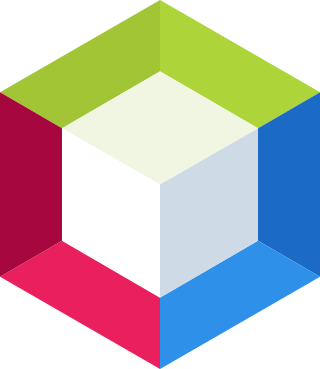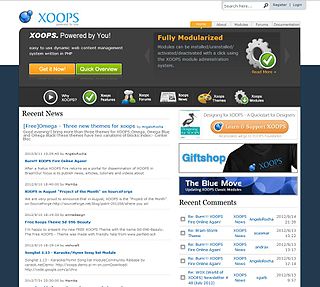PHP-Nuke is a web-based automated news publishing and content management system based on PHP and MySQL originally written by Francisco Burzi. The system is controlled using a web-based user interface. PHP-Nuke was originally a fork of the Thatware news portal system by David Norman.

Macromedia, Inc., was an American graphics, multimedia, and web development software company (1992–2005) headquartered in San Francisco, California, that made products such as Flash and Dreamweaver. It was purchased by its rival Adobe Systems on December 3, 2005.

NetBeans is an integrated development environment (IDE) for Java. NetBeans allows applications to be developed from a set of modular software components called modules. NetBeans runs on Windows, macOS, Linux and Solaris. In addition to Java development, it has extensions for other languages like PHP, C, C++, HTML5, and JavaScript. Applications based on NetBeans, including the NetBeans IDE, can be extended by third party developers.
In web applications, a rewrite engine is a software component that performs rewriting on URLs, modifying their appearance. This modification is called URL rewriting. It is a way of implementing URL mapping or routing within a web application. The engine is typically a component of a web server or web application framework. Rewritten URLs are used to provide shorter and more relevant-looking links to web pages. The technique adds a layer of abstraction between the files used to generate a web page and the URL that is presented to the outside world.

Zend, formerly Zend Technologies, is a Minneapolis, Minnesota-based software company. The company's products, which include Zend Studio, assist software developers with developing, deploying, and managing PHP-based web applications.

XOOPS is a free open-source content management system (CMS), written in PHP. It uses a modular architecture allowing users to customize, update and theme their websites. XOOPS is released under the terms of the GNU General Public License (GPL) and is free to use, modify and redistribute.
eZ Publish is an open-source enterprise PHP content management system that was developed by the Norwegian company Ibexa. eZ Publish is freely available under the GNU GPL version 2 license, as well as under proprietary licenses that include commercial support. In 2015, eZ Systems introduced eZ Platform to replace eZ Publish with a more modern and future-proof solution.
Oracle APEX is an enterprise low-code development platform from Oracle Corporation. APEX is used for developing and deploying cloud, mobile, and desktop applications. The platform offers a web-based integrated development environment (IDE) with a range of features including wizards, drag-and-drop layout, and property editors to simplify the process of building applications and pages.
In computing, a solution stack or software stack is a set of software subsystems or components needed to create a complete platform such that no additional software is needed to support applications. Applications are said to "run on" or "run on top of" the resulting platform.

Django is a free and open-source, Python-based web framework that follows the model–template–views (MTV) architectural pattern. It is maintained by the Django Software Foundation (DSF), an independent organization established in the US as a 501(c)(3) non-profit.

Symfony is a free and open-source PHP web application framework and a set of reusable PHP component libraries. It was published as free software on October 18, 2005, and released under the MIT License.
Morfik Technology Pty Ltd. is an Australian software company that was acquired by Altium in 2010.

Solr is an open-source enterprise-search platform, written in Java. Its major features include full-text search, hit highlighting, faceted search, real-time indexing, dynamic clustering, database integration, NoSQL features and rich document handling. Providing distributed search and index replication, Solr is designed for scalability and fault tolerance. Solr is widely used for enterprise search and analytics use cases and has an active development community and regular releases.
CodeIgniter is an open-source software rapid development web framework, for use in building dynamic web sites with PHP.

MODX is an open source content management system and web application framework for publishing content on the World Wide Web and intranets. MODX is licensed under the GPL, is written in the PHP programming language, and supports MySQL, MariaDB and Percona Server as the database. It was awarded Packt Publishing's Most Promising Open Source Content Management System in 2007.
ZK is an open-source Ajax Web application framework, written in Java, that enables creation of graphical user interfaces for Web applications with little required programming knowledge.
Yii is an open source, object-oriented, component-based MVC PHP web application framework. Yii is pronounced as "Yee" or [ji:] and in Chinese it means "simple and evolutionary" and it can be an acronym for "Yes It Is!".
Apache Struts 2 is an open-source web application framework for developing Java EE web applications. It uses and extends the Java Servlet API to encourage developers to adopt a model–view–controller (MVC) architecture. The WebWork framework spun off from Apache Struts 1 aiming to offer enhancements and refinements while retaining the same general architecture of the original Struts framework. In December 2005, it was announced that WebWork 2.2 was adopted as Apache Struts 2, which reached its first full release in February 2007.

Odoo is a Belgian suite of business management software tools including, for example, CRM, e-commerce, billing, accounting, manufacturing, warehouse, project management, and inventory management.








